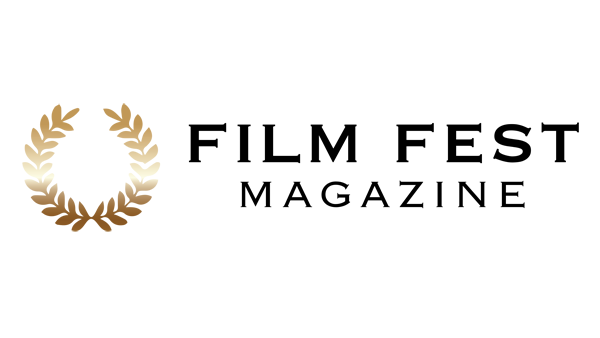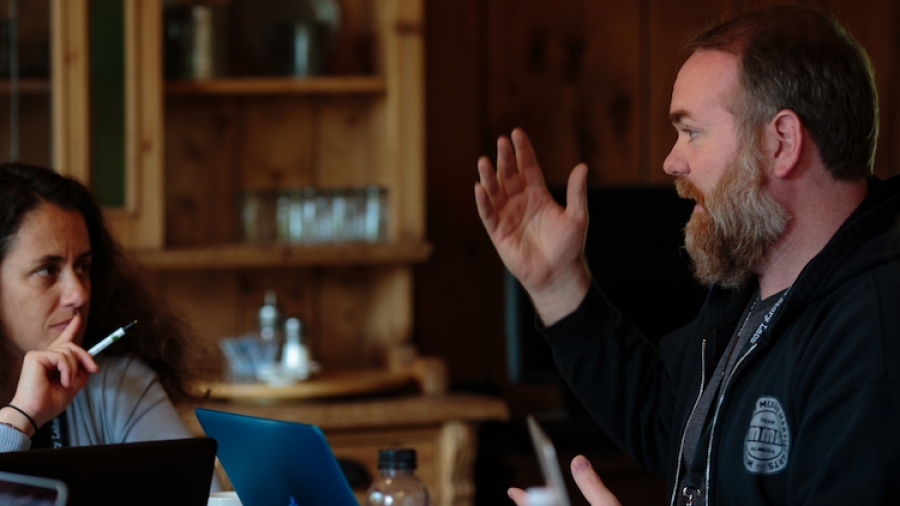Written by Jonah Azurin
Stowe Story Labs is filled with the knowledge you need for a career in the entertainment industry. Running two story labs focused on narrative projects, three writer’s retreats, and various workshops and mentoring programs throughout the year, this program is filled with valuable resources to hone your skills for a professional career. Filmmakers, writers, and producers of all levels have an opportunity to focus on their work in a nurturing environment under this program. I had a chance to chat with Founder and Director, David Rocchio, about the importance of their work at the Labs and how they’re moving forward despite the pandemic.
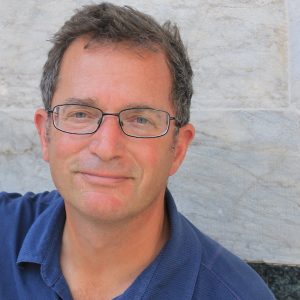
How did Stowe Story Labs get started?
I founded it in 2013 because I was, at the time, just starting to get my work out into the market and I didn’t know what I was doing. I don’t come from a film background and I was stumbling along so I started going to programs. I had a short film in the Cannes Short Film Corner, and I did a workshop on pitching and the writer who ran it now works with me in the Labs – David Pope. David facilitates the producer’s lab at the Rotterdam Film Festival and I was at CineMart. We had dinner one night, and I pitched the idea to him of doing a program up here in northern Vermont. We’re fairly out of the film world. I thought it would be nice to do a once-a-year Lab for filmmakers from New England. That’s what it was the first year, but by the third year we had applications from all over the world and the program met a much broader need. We don’t market; it’s all word-of-mouth. It was wonderful to see it take hold. We now do labs and retreats in Vermont, a lab at the Sidewalk Film Festival in Birmingham, Alabama, which is really cool – very diverse and a powerful regional film festival. And we do a Writer’s Retreat in Palm Springs, California, which makes it easier for people on the West Coast (mentors and participants) to attend. The Labs have become just really empowering, and the cool thing is that I didn’t realize it was going to become as broad-based as it is. I also didn’t anticipate the community that would grow out of it. Once someone comes to an event, there’s a lot of opportunities for alumni to collaborate, to work together, and find each other. That part of it has been fantastic. It just fosters relationship building, skill development, and it’s just really fun.
What are some ways Stowe Story Labs is keeping their audience engaged during this difficult year?
When COVID-19 hit, we were wrapping our application season. Every year we get about 400 applicants for our programs and we admit about 30-35%. We were in the middle of that process and I realized, at least for the spring, it was very unlikely that we were going to run live programs. We didn’t know how we would transition so March, April, and May were really, really hard months. I was worried we would shut down. We pushed programs later in the year and then we decided to use Zoom to see how it might work. We did our first remote Writer’s Retreat in July. Our Writer’s Retreat is limited to about fifteen people. Each participant gets three one-on-one script notes meetings with incredible industry mentors. There is also peer-to-peer work, in-conversation interviews, and group exercises. Mostly, it is an opportunity for participants to write and advance their projects. The Zoom-based Writer’s Retreat went really, really well. There were a couple of unintended consequences; one was that people who are really quite introverted who probably wouldn’t have worked with us live, maybe wouldn’t have traveled to work with us, or would have been more reticent to speak up, on Zoom, [they] were able to engage more. Second, for people who work, they could carve out the time for the 5-day program. Finally, the cost was much more manageable. I think we’ll continue to do remote programs in the future, but we don’t yet know exactly how. Obviously, if we can’t run in-person programs in 2021 because of the novel coronavirus, we’ll do remote programs. Even if we do in-person programs next year, we’ll keep some options available online.
We then did a lab, which is a lot more people. Unlike a retreat, the labs are intense. There’s a lot of content over the four days and that translated really well, too. We start our second remote Lab next week, and it’s full and will be fantastic. The online presentations add value as mentors can work with us without the need to travel; the breakout rooms are great; the small group meetings work well; all the little opportunities to go [into breakout rooms]to talk with peers or mentors is great, so it has worked really well. Beyond the labs and retreats, we will run remote alumni programs we piloted this year. We call them “Story Havens.” They’re writing prompts and small group sessions for alums. We will also run remote writer’s groups and table reads for alums. We’re thinking about starting a full-on screenwriting class and doing a writer’s room program; just a bunch of other ideas. We’re trying to use [online programs] as an advantage. This year has been so difficult, we want to find some positive experience to pull forward out of it.
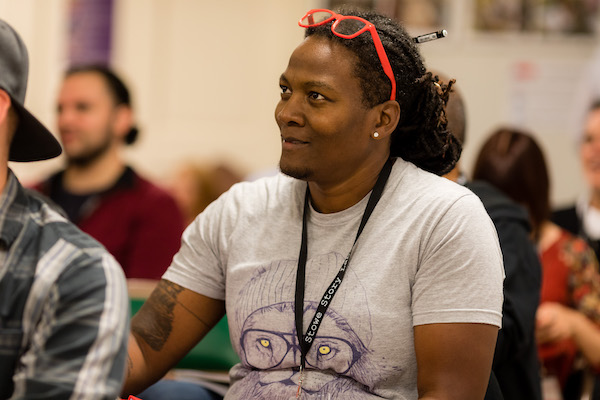
Stowe Story Labs Fellow Lea Robinson.
That’s great! Putting work out there can be intimidating because it’s so vulnerable.
We work really hard at making our people feel not so vulnerable. The way we phrase it when we’re talking to new mentors is that we want our participants to get meaningful feedback in a supportive environment. It’s a collaborative art – we have to learn and work with other people. So we came up with systems so that our participants are engaged and able to advance their work without feeling beaten up, to start to understand the need for meaningful collaboration, and to learn how to give and get meaningful feedback. We don’t just say, “Great, keep going.” We try to be very thoughtful in how we push our artists forward. We also set up our peer-to-peer groups to help forge relationships that can continue after the program and where people learn how to give feedback to each other in a positive way.
For your applicants, do they have to have prior experience in the industry to apply?
We don’t care about your experience level when you apply. We look for people who demonstrate a collaborative nature, are really interested in engaging and learning, and have a really good idea. We also have people who have two or three features under their belt, are working in the industry, and are repped and all that. So we’re totally agnostic on where you are. We have to be really drawn to the story and really drawn to the person. So in the application we ask for a biography; we want to see your work. If you have a short or other things you want to share, there’s an opportunity to do that. We want to know why you are telling the story, what it is about this story that means you have to tell it, and then information about the script. We have good groups every time.
To learn more about Stowe Story Labs and their programs, check out stowestorylabs.org and follow them on Facebook, Instagram, Twitter and LinkedIn. Apply early here, and be sure to connect with David Rocchio on Facebook, Twitter, and Instagram.
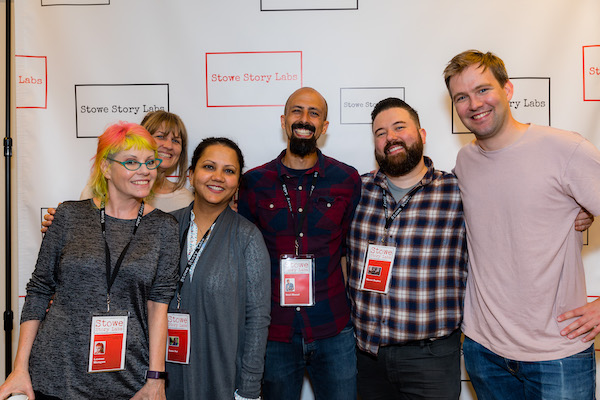
Stowe Story Labs participants at a social gathering during a previous year.
